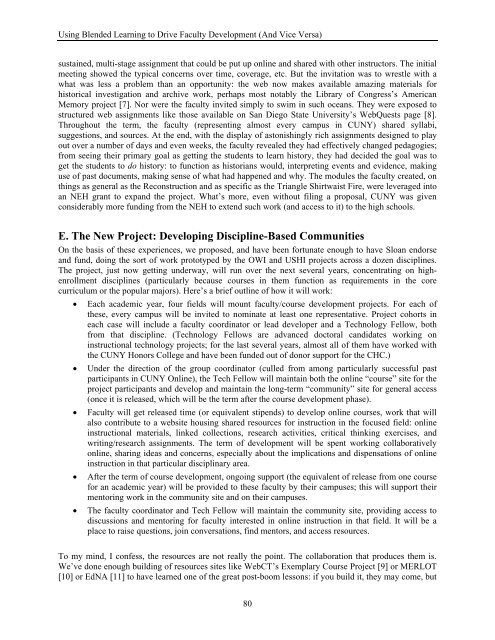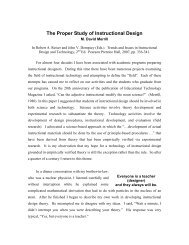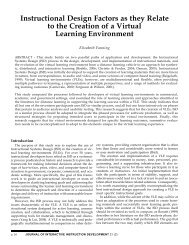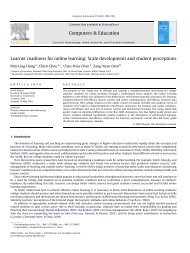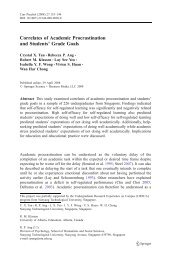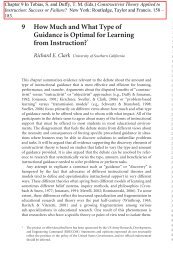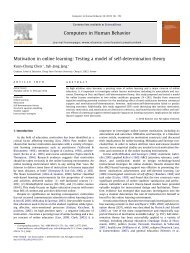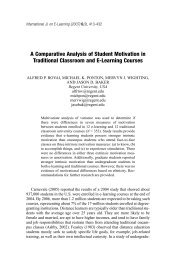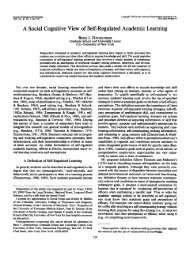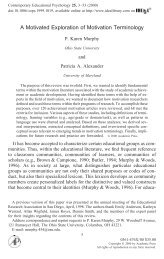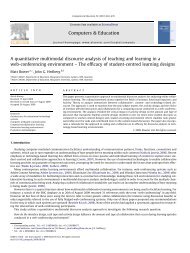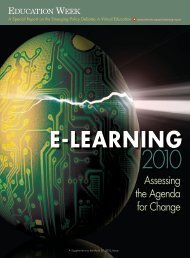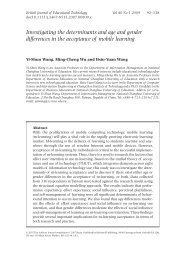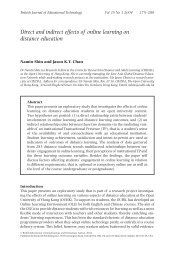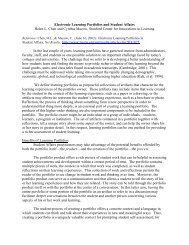Elements of Quality Online Education cation
Elements of Quality Online Education cation
Elements of Quality Online Education cation
Create successful ePaper yourself
Turn your PDF publications into a flip-book with our unique Google optimized e-Paper software.
Using Blended Learning to Drive Faculty Development (And Vice Versa)sustained, multi-stage assignment that could be put up online and shared with other instructors. The initialmeeting showed the typical concerns over time, coverage, etc. But the invitation was to wrestle with awhat was less a problem than an opportunity: the web now makes available amazing materials forhistorical investigation and archive work, perhaps most notably the Library <strong>of</strong> Congress’s AmericanMemory project [7]. Nor were the faculty invited simply to swim in such oceans. They were exposed tostructured web assignments like those available on San Diego State University’s WebQuests page [8].Throughout the term, the faculty (representing almost every campus in CUNY) shared syllabi,suggestions, and sources. At the end, with the display <strong>of</strong> astonishingly rich assignments designed to playout over a number <strong>of</strong> days and even weeks, the faculty revealed they had effectively changed pedagogies;from seeing their primary goal as getting the students to learn history, they had decided the goal was toget the students to do history: to function as historians would, interpreting events and evidence, makinguse <strong>of</strong> past documents, making sense <strong>of</strong> what had happened and why. The modules the faculty created, onthings as general as the Reconstruction and as specific as the Triangle Shirtwaist Fire, were leveraged intoan NEH grant to expand the project. What’s more, even without filing a proposal, CUNY was givenconsiderably more funding from the NEH to extend such work (and access to it) to the high schools.E. The New Project: Developing Discipline-Based CommunitiesOn the basis <strong>of</strong> these experiences, we proposed, and have been fortunate enough to have Sloan endorseand fund, doing the sort <strong>of</strong> work prototyped by the OWI and USHI projects across a dozen disciplines.The project, just now getting underway, will run over the next several years, concentrating on highenrollmentdisciplines (particularly because courses in them function as requirements in the corecurriculum or the popular majors). Here’s a brief outline <strong>of</strong> how it will work:• Each academic year, four fields will mount faculty/course development projects. For each <strong>of</strong>these, every campus will be invited to nominate at least one representative. Project cohorts ineach case will include a faculty coordinator or lead developer and a Technology Fellow, bothfrom that discipline. (Technology Fellows are advanced doctoral candidates working oninstructional technology projects; for the last several years, almost all <strong>of</strong> them have worked withthe CUNY Honors College and have been funded out <strong>of</strong> donor support for the CHC.)• Under the direction <strong>of</strong> the group coordinator (culled from among particularly successful pastparticipants in CUNY <strong>Online</strong>), the Tech Fellow will maintain both the online “course” site for theproject participants and develop and maintain the long-term “community” site for general access(once it is released, which will be the term after the course development phase).• Faculty will get released time (or equivalent stipends) to develop online courses, work that willalso contribute to a website housing shared resources for instruction in the focused field: onlineinstructional materials, linked collections, research activities, critical thinking exercises, andwriting/research assignments. The term <strong>of</strong> development will be spent working collaborativelyonline, sharing ideas and concerns, especially about the impli<strong>cation</strong>s and dispensations <strong>of</strong> onlineinstruction in that particular disciplinary area.• After the term <strong>of</strong> course development, ongoing support (the equivalent <strong>of</strong> release from one coursefor an academic year) will be provided to these faculty by their campuses; this will support theirmentoring work in the community site and on their campuses.• The faculty coordinator and Tech Fellow will maintain the community site, providing access todiscussions and mentoring for faculty interested in online instruction in that field. It will be aplace to raise questions, join conversations, find mentors, and access resources.To my mind, I confess, the resources are not really the point. The collaboration that produces them is.We’ve done enough building <strong>of</strong> resources sites like WebCT’s Exemplary Course Project [9] or MERLOT[10] or EdNA [11] to have learned one <strong>of</strong> the great post-boom lessons: if you build it, they may come, but80


